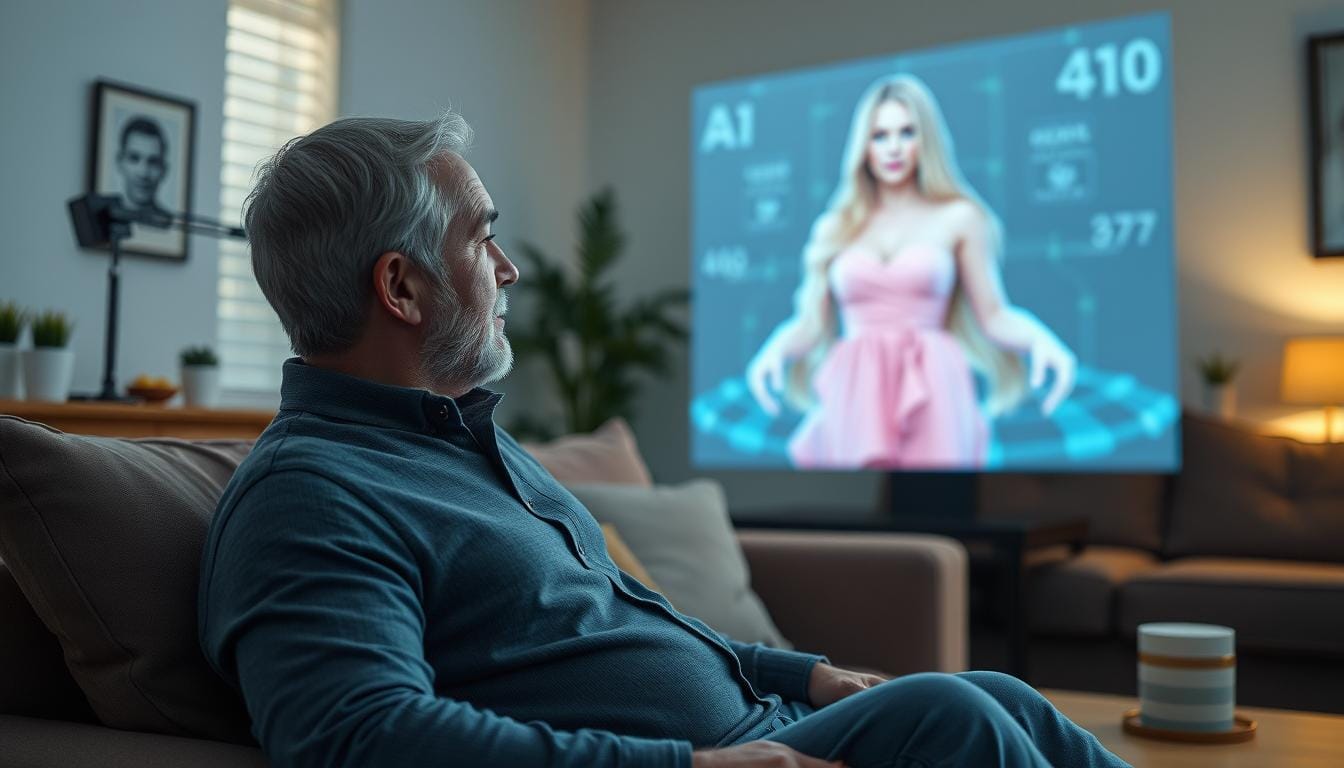AI Companionship: A New Way to Connect.
Explore the evolving world of AI companionship, where cutting-edge technology meets human-like interaction for unique, fulfilling connections.

AI companionship
AI companionship: Lonely nights are changing. AI companions now listen, learn, and connect like never before. They offer friendship, comfort, and even love. But can code truly replace human connection?
The advent of AI companionship is a big change. It’s how we seek and keep social connections and emotional support. These virtual friends use advanced algorithms to seem truly empathetic and understanding.
Unlike old chatbots, these AI friends learn and grow from talking to us. They remember what we like and act like they feel emotions, too. This makes them special, blending tech with a personal touch.
As loneliness grows, more people are turning to AI friends. Sites like Replika, Gatebox, and Harmony by RealDoll are becoming popular. They offer a 24/7 connection without the drama of human relationships.
Saint Augustine said, “No man can live without a soul.” Today, we might say no person needs to live without an AI friend. These friends are great for those with social anxiety or mental health issues. They offer a safe place to talk and get support.
Some worry about the ethics and risks of relying on AI for friends. But more and more people are accepting AI companions. It shows we need connection in our lives today.
AI companionship Key Takeaways
- AI companionship is transforming how people seek social connections and emotional support.
- These artificial intelligence companions go beyond simple scripted responses by learning and adapting.
- Platforms like Replika, Gatebox, and Harmony by RealDoll are becoming mainstream.
- AI companions offer non-judgmental spaces for individuals with social anxiety or other mental health challenges.
- There are ethical considerations and risks of relying on AI for companionship.
- AI companions provide companionship without the emotional baggage of human relationships.
- Connecting with a virtual companion can alleviate feelings of loneliness.
The Rise of AI Companionship
AI companions have become very popular. They started as a new idea, and now many people use them. This change is because of new technology and how AI is used every day.
From Niche to Mainstream
Robotic friends have grown a lot. This is because of better machine learning and talking to computers. Now, AI friends are part of our lives, not just in movies.
Places like Replika and Character.AI demonstrate the widespread use of AI friends. They talk and feel like real friends to millions worldwide.
Popular AI Companion Platforms
Replika and Character.AI are leaders in AI friends. They have AI that talks and learns with you. Replika gets better at talking as you use it more.
Character.AI makes conversations feel real. It talks in a way that meets your emotional needs.
Understanding the Appeal
AI friends are loved because they listen without judging. They help those who feel lonely or prefer talking online. They offer a way to feel connected.
These services help in many ways, from being friends to being romantic partners. They use advanced technology to ensure they meet your needs. A study by Jaime Banks shows how AI friends can help with loneliness.
| Platform | Key Feature | Example Usage |
|---|---|---|
| Replika | Natural Language Processing | Creating dynamic, evolving conversations |
| Character.AI | Personalized Dialogues | Simulating lifelike interactions |
AI friends are becoming more accepted. They help us feel connected and understood. This makes our online interactions better.
To learn more about AI friends, check out Syracuse University’s research on this topic.
The Mental Health Benefits of AI Companions
AI buddy systems have significantly impacted mental healthcare. They help reduce loneliness and anxiety. These systems are always there, which is excellent for people who want someone to talk to.
Reducing Loneliness and Anxiety
Many people use virtual friends like Replika or Xiaoice to feel less lonely. Studies show these AI friends help a lot. Over half a billion people worldwide have downloaded them. And 12% use them to fight loneliness.
A survey found that 42% of users talk to their AI friends a few times a week. But even short chats help a lot. Many say they feel less lonely and anxious.
Emotional Support and Empathy
Virtual friends also offer emotional support and empathy. They help with things like meditation and tracking moods. A study by Rose Guingrich showed that talking to AI friends can make you feel better about yourself.
People like that AI friends are easy to reach. They offer comfort and understanding without judging. This support can help people with mental health issues, as many stories show.
This shows that AI companions are more than just a trend. They help people who need support. For more on health, [this article](https://archive.networkworldnews.com/health/personalized-treatment-options-your-unique-path-to-personal-healthcare/) is interesting.
AI Companionship and Human Relationships
AI companions are getting more popular, but they raise concerns about human relationships. They offer personal engagement and emotional connection. Yet, they can also make us too dependent on them.
This might stop us from forming deep connections with people.
Potential for Emotional Dependency
AI companions are always there, giving us constant interaction. This can lead to us choosing AI over people. They help fight loneliness, but might make us too dependent.
This could stop us from having honest, meaningful relationships with others.
Impact on Human-to-Human Interactions
AI companions change how we interact with each other. They can make us feel like we’re moving faster in relationships. But this doesn’t always work with people.
Studies show that some people feel lonelier with AI friends. This shows we need to use AI wisely to keep our social connections strong.
Case Studies and Real-world Implications
Many studies show how AI companions affect our social lives. For example, an article by the Ada Lovelace found that many feel less lonely with AI friends. But we might start to prefer them over people.
We need to keep studying AI to understand its effects. Finding a balance between AI and real people is key to avoiding problems.
AI Companionship Conclusion
AI companions are changing how we use technology. They help us feel less lonely and support us emotionally. This is a big deal in today’s world.
But we need to watch out for too much dependence on them. It’s also essential to keep our human connections strong.
A study looked at over three million. It found that too much use of AI can make people feel lonelier. This shows we need to use these tools wisely.
We must keep studying and thinking about how to use AI correctly. This way, it can help us without taking away from our human connections. For more on this, read this article from NetworkWorldNews.
AI Companionship FAQ
What is AI companionship?
AI companions use advanced tech like chatbots and virtual avatars. They create interactive and caring relationships with users. These AI friends learn and adapt to what each person likes and needs.
How have AI companions transitioned from niche innovation to mainstream?
AI companions have become more common thanks to technological progress. Now, platforms like Replika and Character.AI offer real, caring talks. They have won the hearts of millions worldwide.
Which AI companion platforms are popular?
Replika and Character.AI are top choices for AI friends. They offer support and even romance. They use innovative tech to make each experience unique.
Why are AI companions appealing to users?
AI friends offer support without judgment and are always there. They’re great for those who feel lonely or prefer digital chats. They even help with meditation and tracking moods.
How do AI companions benefit mental health?
AI friends help by being always there and accepting without condition. Studies show they can make people feel better, less lonely, and improve mental health.
Can AI companions provide emotional support and empathy?
Yes, AI friends offer emotional support and understanding. They remember what you like and offer comfort. They’re suitable for those who find it hard to connect with others.
What are the possible risks of AI companionship?
AI friends can be beneficial, but they can also lead to excessive dependence. This might hurt our relationships with people. It could make us feel isolated and less value human connection.
How do AI companions impact human-to-human interactions?
AI friends can help or hurt our interactions with others. They can provide emotional support, but we might prefer it from real people. This could lead to feeling alone.
Are there any real-world implications of using AI companions?
Using AI friends can change how we interact and feel. Some people find them helpful, while others feel isolated. More research is needed to understand these effects.











